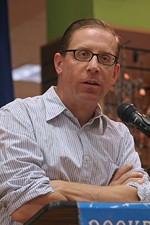Media Clips
Out-Foxed: Reporters Fired by Fox Come to Austin to Tell Their Story
By Lee Nichols, Fri., Feb. 4, 2000
The two prepared a four-part series revealing this betrayal. The series explained why rBGH, although FDA-approved, is so controversial (its use is currently banned in Canada and the European Union because it has been linked to cancer in animal studies). According to Akre and Wilson, their then-employer, Fox-13 in Tampa, was set to run with the story -- until both station and Fox network management received a letter from lawyers for Monsanto, the agribusiness behemoth which produces rBGH.
Suddenly, the reporters say, station managers demanded changes in the script, including adherence to Monsanto's claims that rBGH was safe. After a protracted battle, the reporters say they were fired for standing up for the truth. Since then, they have filed suit against Fox demanding damages for being unjustly fired.
Akre and Wilson are coming to Austin on Wednesday, Feb. 9, to deliver a lecture at 7pm in the Bass Lecture Hall in Sid Richardson Hall on the UT campus. The speech will detail their charges, which are also laid out on their Web site, http://www.foxbghsuit.com.
As you might expect, Fox has a very different take on the whole situation and strongly denies Akre and Wilson's claims. The network's legal response can be found on the same site at http://www.foxbghsuit.com/complaint.html.
"Media Clips" caught up with Akre and Wilson by telephone in Tampa two weeks ago.
Austin Chronicle: Monsanto and Fox both questionyour science. How do you respond to that?
Jane Akre: First of all, Monsanto has no room to talk. Monsanto puts out things that they know to be untrue. They make public statements that are in direct contradiction to what their own science shows. ... It's heavy spin, and ...
Steve Wilson: ... and outright lies.
JA: And when things don't show what they want them to show, and they haven't been able to hold back -- many charge that they just have not released the studies that are most detrimental -- they just spin it and they reverse themselves. I did catch them several times just flat-out reversing themselves.
As for Fox, Fox knows very well that the science we showed them was peer-reviewed, solid science, and I don't know what else I would expect them to say. I certainly wouldn't expect them to say, "This is a terribly well-documented story but we just got a letter from Monsanto and decided not to run it." In fact, the news director has said, on record, in his deposition, that there were no problems with the story. ... That was never the issue. It was, "What do we do when Monsanto is breathing down our necks?"
AC: How do you respond to the fact that the FDA [U.S. Food and Drug Administration] had already given approval to this [hormone]?
SW: The FDA has given approval to a number of drugs and other things that have later turned out to be dangerous. Can you say phen-fen? That's just the most recent example. I think the approval of aspartame is highly questionable. I don't think the jury is in yet on whether or not that was a thoroughly reviewed drug, especially when the then-FDA commissioner approved aspartame over the objections of the scientific panel at the time. ... There's just been a whole range of things.
JA: And also, let's look at what Canada did. When they looked at the same studies, they said to the U.S., "Why did you approve this stuff?" They had five scientists stand up, at risk of losing their jobs, and say, "We're not going to sign off on this product. We don't believe it's safe for Canadians. And we don't know what the U.S. FDA did, but we're not going to do it."
SW: The most significant aspect of the fact that Canada has now rejected this drug after looking at it for seven years is the fact that the Canadian government scientists, the impartial scientists who work for Health Canada [the Canadian equivalent of the FDA], have stated that Americans were either lied to or misled when the FDA looked at a key study. Monsanto submitted a study on 30 rats that were fed rBGH for 90 days, and they claimed that those rats showed no signs of any problems after having rBGH. It was on the basis of that study that the FDA scientists assured the nation that no further tests for human safety were needed and approved it. Fast-forward to Canada reviewing the same testing and the same pivotal study and finding it isn't true that those rats had no antibody responses.
AC: In their legal response, Fox claims that you "have a history of employment termination and difficult working relationships during [your] careers."
SW: I was at the last place I worked for six years, and I have a history of working in places for a fairly long time. I don't bounce from job to job.
I do solid work. I have never in my 28-year career been into court to defend any report that I have ever broadcast. I've never had any problem like that. ... I always raise the question, "Exactly what is the proper response when you're asked to lie and mislead viewers on television?" What are you supposed to do? Did I argue? Did I resist? Did I tell them it was wrong? I sure did. Is that being difficult to get along with? I suppose if you are somebody who wanted to cave in to what Monsanto wanted so you could keep an advertiser happy and avoid a lawsuit, I guess that is being difficult. But, you know, I think every reporter has an obligation to stand up for the truth.
The other thing I would say in defense of that is that the largest group of professional journalists in the country looked at what we have done and awarded us the [Society of Professional Journalists] award for ethics. I think if we were just hard to get along with and if there wasn't any fire with all of that smoke, they wouldn't be sticking their necks out. We've also gotten similar ethics awards from other groups like the Ralph Nader Foundation.
AC:You allege that they asked you not only to rework the report, but also to insert false information. What was that false information?
JA: They wanted things such as "There is no difference in the milk." They wanted that in there unrefuted with no context, and there was plenty of context to show that was not true.
SW: That was really the whole cornerstone of the lie. Monsanto has struggled from day one to convince consumers that injecting cows with this hormone does not have any effect whatsoever on the milk that ends up on your table. Monsanto's own studies show that's not true. The FDA has said that's not true. The milk is different. The biggest difference and the most worrisome for some people is the fact that it increases the levels of Insulin-like Growth Factor-I [IGF-1], a spinoff byproduct of bovine growth hormone. High levels of IGF-1 has been linked to a higher risk of cancer. ...
For us to be ordered to go on the air and tell people there is no difference is an outright lie. You can argue that the difference is insignificant, that the difference doesn't lead to a higher risk of cancer ... you can make all those arguments, but you cannot report honestly that there is no difference. And that was the cornerstone of the whole thing. If they could get consumers to believe there was no difference, then consumers would tune out any other kinds of concern, because if it's not different, then what do I care?
When you look at what what we set out to do here, it was really a simple, basic story. There was really no reason -- unless we touched a raw nerve, which obviously is what we did -- that this should have been such a disaster from a journalism standpoint. All we ever wanted to say to people was: Three years years ago, when this controversial product was approved, all the big local grocery chains held news conferences and put out advertisements and said, "We know you're upset about this; we promise you that we will not use this product. We will not buy milk from cows injected with this hormone until everybody is satisfied that it's safe." And, come to find out ... they lied. They knew when they made that promise -- or according to the sworn testimony, they found out shortly thereafter -- there was no way in the world they could keep that promise.
JA: And also, we never said that this will give you cancer. That would be a foolish thing for us to say. Nobody can say that. All we said was there is potential. There are lines of evidence that suggest a link, and we wanted to tell what those lines were and explain the credentials of the people who are bringing that forth. The Sunday morning talk shows continue to be useless in trying to size up the presidential race -- they only talk about what the candidates need to do to win, rather than what voters need to know about the candidates in order to make an informed choice. Because an uninformed electorate tends to vote for the candidate with the best-financed ad campaign (i.e., Gov. George W. Bush), the Chronicle has taken to calling it a coronation, rather than an election.
But there is good reporting out there on the governor who would be king.
The best examination we've seen thus far of Bush's environmental record came from the National Public Radio show Living on Earth. The show, which airs locally on KUT (90.5FM) every Thursday from 7-8pm, offers up excellent commentary on environmental issues.
In the past couple of weeks, LOE has been scrutinizing the environmental records of the major presidential contenders. NPR correspondent Janet Heimlich (an occasional contributor to the Chronicle) covered Bush in the program for the week of Jan. 14, and noted that while Bush talks a good game about the environment, he has taken virtually no concrete action to clean up Texas' dirty air, nor does he have a vision for doing so in the future. "Republican voters concerned about the environment may be casting their ballots without knowing precisely where George W. Bush stands," Heimlich asserted.
Following her report, LOE political observer Mark Hertsgaard derided Bush's environmental initiatives -- which called for grandfathered facilities to voluntarily comply with regulations -- as "music to the ears of industrial polluters."
"It's all a PR exercise," Hertsgaard said. "Gov. Bush was happy to join in that, and to tell the press that we stand for clean air here in Texas. And yet, when you look at what happened after those regulations were passed, almost none of the facilities in question actually decreased their pollution."
To hear those programs and Living on Earth's coverage of all the candidates in Real Audio, go to http://www.loe.org/indexpol5.htm. ![]()
Got something to say on the subject? Send a letter to the editor.








